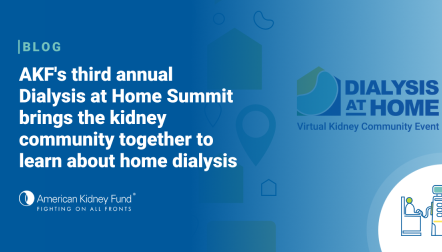
Blog post
Managing your mental health while living with kidney disease
As we wind down the month of October, AKF recognizes National Depression and Mental Health Screening Month. Focusing on our mental health is important every day of the year, but October is a time to reinforce our commitment to this essential part of our overall wellbeing.
There are numerous aspects of a person's life that have an influence on their mental health, with one of those factors being physical health. Living with a serious condition like kidney disease can take a toll on how you feel psychologically and being on dialysis can be an added stressor. In fact, studies show that people on hemodialysis report lower levels of happiness compared to the general population. There are many reasons for this, including inactivity from having to sit to complete dialysis sessions, decreased leisure time, fatigue and pain resulting from dialysis, adhering to a restricted selection of foods and fluids, changes in employment status, and a sense of helplessness and lack of autonomy. On top of this, being mentally unwell may increase your chance for poor health outcomes, since poor mental health can affect your eating habits, sleep, memory, energy level and your ability to stay on treatments prescribed by a doctor. It can feel like a vicious, unending cycle.
However, while these feelings and experiences are common among people with kidney disease and people on dialysis, they do not have to be a permanent reality – there is hope and support available that can help you feel better and give you a good quality of life. Here are some steps you can take to get the help you need:
- If you are on dialysis and receive treatment from a clinic that has a social worker, talk to them and ask them to connect you with resources in your area. Social workers can also help you communicate your needs with your doctor.
- Engage in self-help and self-care. There are many resources and tools you can access on your own, such as:
- Self-help books, which can help you gain greater understanding of your thoughts and feelings.
- Exercise, which may help improve your mood. Be sure to talk to your doctor before starting a new exercise routine.
- Kidney-friendly eating. Kidney Kitchen provides information on how to eat for different stages of kidney disease.
- Quality sleep. Not getting enough sleep effects your mood, energy level and attention span. Try to go to bed at the same time every night and wake up at the same time each morning.
- Your social networks. Talking to family, friends and loved ones can help you feel connected, supported and encouraged as you continue to manage your kidney disease or your dialysis treatment.
- Support groups. There are many in-person and online support groups available across the country, where you can talk to other people with kidney disease about your experiences, struggles and triumphs. If you receive dialysis, ask your dialysis clinic if there are groups they can recommend.
- Seek professional treatment, whether that be therapy, medicine, or both. Mental health providers include psychologists, psychiatrists, social workers, therapists and counselors. They can talk to you about your symptoms, feelings and thoughts and provide a diagnosis as well as work with you to select the best method of treatment. For a list of resources to help you find professional help, click here and scroll down to "How to get professional help."
Remember – you are not alone as you manage your kidney disease or your dialysis treatment! There are millions of people out there who are experiencing the same thing you are, and many more who want to help you feel your best.





